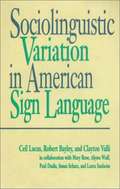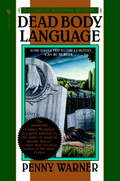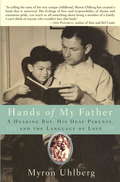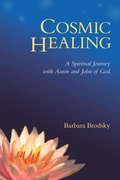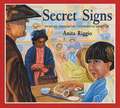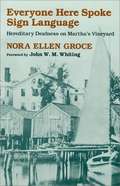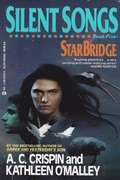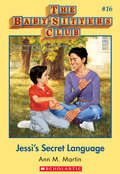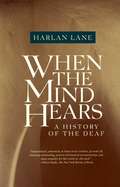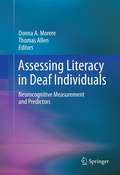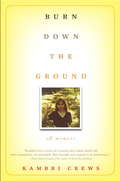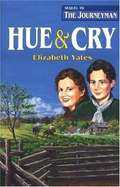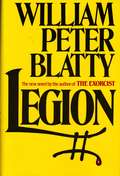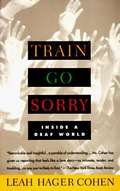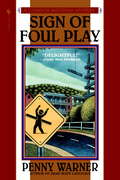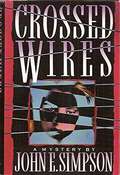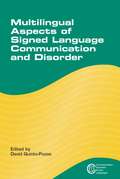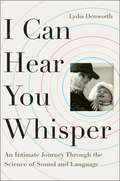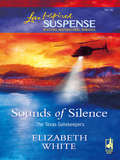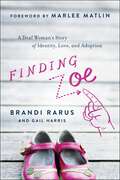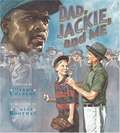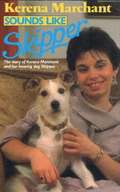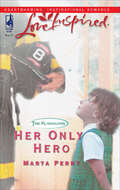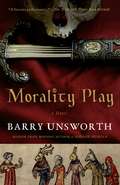Special Collections
Deaf Special Collection
Description: A strong collection featuring biographies, fiction and non-fiction by and about members of the deaf community. For books by and about individuals who are deafblind, visit https://www.bookshare.org/browse/collection/194343 #disability
- Table View
- List View
Sociolinguistic Variation in American Sign Language
by Ceil Lucas and Robert Bayley and Clayton ValliThis volume provides a complete description of ASL variation. People from varying regions and backgrounds have different ways of saying the same thing. For example, in English some people say "test," while others say "tes'," dropping the final "t. " Noted scholars Ceil Lucas, Robert Bayley, and Clayton Valli led a team of exceptional researchers in applying techniques for analyzing spoken language variation to ASL. Their observations at the phonological, lexical, morphological, and syntactic levels demonstrate that ASL variation correlates with many of the same driving social factors of spoken languages, including age, socioeconomic class, gender, ethnic background, region, and sexual orientation. Internal constraints that mandate variant choices for spoken languages have been compared to ASL as well, with intriguing results.
Dead Body Language
by Penny WarnerThirty-seven year old journalist, Connor Westphal, has relocated from San Francisco to Flat Skunk, a mining-turned-tourist town in the foothills of the Sierras, to start up her own weekly paper. Suddenly, dead bodies begin turning up in the most unusual places, setting Connor on a hunt for a killer. You might say Connor has a sixth sense when it comes to investigating...but she only has four of the usual five senses. Connor Westphal is deaf. But being hearing impaired doesn't stop Connor from pursuing the murderer. Without sound to distract her, she attends to subtleties that others overlook and ultimately unravels the mystery.
Hands of My Father
by Myron UhlbergBy turns heart-tugging and hilarious, Myron Uhlberg's memoir tells the story of growing up as the hearing son of deaf parents--and his life in a world that he found unaccountably beautiful, even as he longed to escape it."Does sound have rhythm?" my father asked. "Does it rise and fall like the ocean? Does it come and go like the wind?" Such were the kinds of questions that Myron Uhlberg's deaf father asked him from earliest childhood, in his eternal quest to decipher, and to understand, the elusive nature of sound. Quite a challenge for a young boy, and one of many he would face. Uhlberg's first language was American Sign Language, the first sign he learned: "I love you."
But his second language was spoken English--and no sooner did he learn it than he was called upon to act as his father's ears and mouth in the stores and streets of the neighborhood beyond their silent apartment in Brooklyn. Resentful as he sometimes was of the heavy burdens heaped on his small shoulders, he nonetheless adored his parents, who passed on to him their own passionate engagement with life. These two remarkable people married and had children at the absolute bottom of the Great Depression--an expression of extraordinary optimism, and typical of the joy and resilience they were able to summon at even the darkest of times.
From the beaches of Coney Island to Ebbets Field, where he watches his father's hero Jackie Robinson play ball, from the branch library above the local Chinese restaurant where the odor of chow mein rose from the pages of the books he devoured to the hospital ward where he visits his polio-afflicted friend, this is a memoir filled with stories about growing up not just as the child of two deaf people but as a book-loving, mischief-making, tree-climbing kid during the remarkably eventful period that spanned the Depression, the War, and the early fifties.
Cosmic Healing
by Barbara BrodskyWith the onset of sudden profound deafness at the age of 29, Barbara Brodsky set out on a quest to understand the nature of illness and healing, examining the interrelationship of mind and body and our capacity to transcend limitation. Asking the questions What is healing? Who and what heals? Why do some people heal while others do not? she discusses karma and free will, our habit of identifying with a limited sense of self, and our potential for greater healing.
A longtime Buddhist practitioner who began meditation in the '60s, Brodsky discovered a new path on her healing journey when she began channeling the spirit Aaron in 1989. Based on three decades of meticulously kept journals, Cosmic Healing weaves together Brodsky's Buddhist teachings, channeled material from Aaron, exercises for the reader, and an account of her experiences with the healer known as John of God (João Teixeira de Faria) at his teaching center, Casa de Dom Inácio, in Brazil. While Cosmic Healing is channeled in part and has deep roots in traditional dharma, it is at heart a universal story of human growth and discovery. Old beliefs limit us every day. But as Brodsky discovered and teaches, we can learn to recognize such limiting beliefs, transcend them, and live a deeper truth.
Secret Signs
by Anita RiggioIn the mid-1800s, a boy and his mother help support themselves by making panoramic eggs of maple sugar. The boy, Luke, who is deaf, paints pictures that fit neatly inside the eggs. When a man bursts into their home and accuses them of hiding slaves, Luke's mother can honestly deny the charge. But she is that very day planning to meet their contact on the Underground Railroad to pass along information regarding the next "safe haven." Luke's mother is held at home, but the boy is courageous and resourceful in using his creative talents to help make the connection.
Everyone Here Spoke Sign Language
by Nora E. GroceFrom the seventeenth century to the early years of the twentieth, the population of Martha's Vineyard manifested an extremely high rate of profound hereditary deafness.
In stark contrast to the experience of most deaf people in our own society, the Vineyarders who were born deaf were so thoroughly integrated into the daily life of the community that they were not seen-- and did not see themselves-- as handicapped or as a group apart. Deaf people were included in all aspects of life, such as town politics, jobs, church affairs, and social life.
How was this possible? On the Vineyard, hearing and deaf islanders alike grew up speaking sign language. This unique sociolinguistic adaptation meant that the usual barriers to communication between the hearing and the deaf, which so isolate many deaf people today, did not exist.
Silent Songs
by A. C. Crispin and Kathleen O'MalleyThe men and women of StarBridge found intelligent life -- and new friends -- across the galaxy... In the skies of Trinity, the birdlike Grus welcomed the deaf human ambassador, Tesa. In the seas of Trinity, the aquatic Singers communicated with the young telepath, Jib. But on the surface of Trinity, a different kind of life form has landed. They are amphibious beings from a distant world. And they are definitely -not- friendly...
Jessi's Secret Language
by Ann M. MartinThe hit series is back, to charm and inspire another generation of baby-sittersJessi knows a secret language! She learned it from Matt Braddock, the BSC's newest charge. Matt's been deaf since birth, and he uses sign language to speak. Since Jessi is Matt's baby-sitter, she's been using sign language, too.Soon all the kids in Stoneybrook want to learn to sign . . . which keeps the Baby-sitters busy. Jessi's the busiest of all: she working on another secret just for Matt. Will she be able to keep the secret and pull off her special event?The best friends you'll ever have--with classic BSC covers and a letter from Ann M. Martin!
When the Mind Hears
by Harlan LaneImpassioned, polemical, at times even virulent, the author shows immense scholarship, powers of historical reconstruction, and deep empathy for the world of the deaf. The unimaginable world of those who have been born deaf is made almost imaginable by Lane's account of their history. The author's passion and directness are delivered through the mouth of one of his subjects, himself deaf, who became an intellectual leader of the deaf community in France and then in America. The story he tells is extraordinary and is perhaps the best illustration of what it means to see the condition and the patient as a whole.
Assessing Literacy in Deaf Individuals
by Donna Morere and Thomas AllenHumans' development of literacy has been a recent focus of intense research from the reading, cognitive, and neuroscience fields. But for individuals who are deaf--who rely greatly on their visual skills for language and learning--the findings don't necessarily apply, leaving theoretical and practical gaps in approaches to their education.
Assessing Literacy in Deaf Individuals: Neurocognitive Measurement and Predictors narrows these gaps by introducing the VL2 Toolkit, a comprehensive test battery for assessing the academic skills and cognitive functioning of deaf persons who use sign language. Skills measured include executive functioning, memory, reading, visuospatial ability, writing fluency, math, and expressive and receptive language. Comprehensive data are provided for each, with discussion of validity and reliability issues as well as ethical and legal questions involved in the study. And background chapters explain how the Toolkit was compiled, describing the procedures of the study, its rationale, and salient characteristics of its participants. This notable book:
Describes each Toolkit instrument and the psychometric properties it measures.
Presents detailed findings on test measures and relationships between skills.
Discusses issues and challenges relating to visual representations of English, including fingerspelling and lipreading.
Features a factor analysis of the Toolkit measures to identify underlying cognitive structures in deaf learners.
Reviews trends in American Sign Language assessment.
Assessing Literacy in Deaf Individuals is an essential reference for researchers, graduate students, clinicians, and other professionals working in the field of deafness and deaf education across in such areas as clinical child and school psychology, audiology, and linguistics.
Burn Down the Ground
by Kambri CrewsIn this powerful, affecting, and unflinching memoir, a daughter looks back on her unconventional childhood with deaf parents in rural Texas while trying to reconcile it to her present life--one in which her father is serving a twenty-year sentence in a maximum-security prison.
As a child, Kambri Crews wished that she'd been born deaf so that she, too, could fully belong to the tight-knit Deaf community that embraced her parents. Her beautiful mother was a saint who would swiftly correct anyone's notion that deaf equaled dumb. Her handsome father, on the other hand, was more likely to be found hanging out with the sinners. Strong, gregarious, and hardworking, he managed to turn a wild plot of land into a family homestead complete with running water and electricity. To Kambri, he was Daniel Boone, Frank Lloyd Wright, Ben Franklin, and Elvis Presley all rolled into one. But if Kambri's dad was Superman, then the hearing world was his kryptonite. The isolation that accompanied his deafness unlocked a fierce temper--a rage that a teenage Kambri witnessed when he attacked her mother, and that culminated fourteen years later in his conviction for another violent crime.
With a smart mix of brutal honesty and blunt humor, Kambri Crews explores her complicated bond with her father--which begins with adoration, moves to fear, and finally arrives at understanding--as she tries to forge a new connection between them while he lives behind bars. Burn Down the Ground is a brilliant portrait of living in two worlds--one hearing, the other deaf; one under the laid-back Texas sun, the other within the energetic pulse of New York City; one mired in violence, the other rife with possibility--and heralds the arrival of a captivating new voice.
Hue & Cry
by Elizabeth YatesJared Austin, staunch member of the mutual protection society that defends his 1830s New Hampshire community against thieves, tries to temper justice with mercy when his deaf daughter Melody befriends a young Irish immigrant who has stolen a horse.
Legion
by William Peter BlattyA young boy, a deaf-mute, is found horribly murdered. The detective assigned to the case sees it as part of a larger and more baffling mystery...
Train Go Sorry
by Leah Hager CohenThis portrait of New York's Lexington School for the Deaf is not just a work of journalism. It is also a memoir, since Leah Hager Cohen grew up on the school's campus and her father is its superintendent. As a hearing person raised among the deaf, Cohen appreciates both the intimate textures of that silent world and the gulf that separates it from our own.
Sign of Foul Play
by Penny WarnerLast night's earthquake has the California Gold Country town of Flat Skunk buzzing; and over her morning mocha, deaf newswoman Connor Westphal is shaping it into a lead story for her local paper, the Eureka! Then her TTY phone brings more sensational news: a twisted corpse has been found on a construction site owned by her rival publisher, Harlan Truax. What was the dead soil engineer doing there at midnight, and was it the quake that toppled him four stories to his death? An act of God--or human malevolence?Connor is soon back in the sleuth business, uncovering Flat Skunk's darkest secrets: from toxic dirt to tainted relationships. But someone's out to stop her, and they're saying it with flowers, verses, menacing e-mail--and a series of murders that could knock the numbers off the Richter scale and silence one lip-reading reporter forever.
Crossed Wires
by John E. SimpsonCrossed Wires, a highly original mystery novel, introduces readers to an unusual heroine, who is being stalked by a particularly chilling serial killer. Finley is tenacious, sympathetic, and attractive. What then makes her an unusual sleuth? Finley is deaf. And Finley and the murderer who hunts her inhabit, literally, a new world -almost a new dimension. They live an important part of their lives within the electronic bulletin boards accessed by their personal computers.
Finley, whose hearing impairment makes her vulnerable, has learned to live and rely upon faceless friends, especially Tracy and Jane, she knows only through her modem. She works as a researcher at CIAC, the National Crime Information and Analysis Center in New Brunswick, New Jersey, a very sophisticated clearing house for law enforcement agencies. Even without romance, life is pretty good for Finley, with a challenging job as an electronic detective and an apparently reliable set of friends, until one beautiful fall morning the ebullient Tracy is murdered - her throat slashed and her computer's memory wiped clean.
Multilingual Aspects of Signed Language Communication and Disorder
by David Quinto-PozosInquiry into signed languages has added to what is known about structural variation and language, language learning, and cognitive processing of language. However, comparatively little research has focused on communication disorders in signed language users. For some deaf children, atypicality is viewed as a phase that they will outgrow, and this results in late identification of linguistic or cognitive deficits that might have been addressed earlier. This volume takes a step towards describing different types of atypicality in language communicated in the signed modality such as linguistic impairment caused by deficits in visual processing, difficulties with motor movements, and neurological decline. Chapters within the book also consider communication differences in hearing children acquiring signed and spoken languages.
I Can Hear You Whisper
by Lydia DenworthAn investigation into the science of hearing, child language acquisition, neuroplasticity, brain development, and Deaf culture.
A mother notices her toddler is not learning to talk the way his brothers did... Is something wrong? Her search for answers is a journey into the mysteries of the human brain.
Lydia Denworth's third son, Alex, was nearly two when he was identified with significant hearing loss that was likely to get worse. Her sweet boy with the big brown eyes had probably never heard her lullabies.
Denworth knew the importance of enrichment to the developing brain but had never contemplated the opposite: Deprivation. How would a child's brain grow outside the world of sound most of us take for granted? How would he communicate? Would he learn to read and write--weren't phonics a key to literacy? How long did they have until Alex's brain changed irrevocably?
In her drive to understand the choices--starting with the angry debate between supporters of American Sign Language and the controversial but revolutionary cochlear implant--Denworth soon found that every decision carried weighty scientific, social and even political implications. As she grappled with the complex collisions between the emerging field of brain plasticity, the possibilities of modern technology, and the changing culture of the Deaf community, she gained a new appreciation of the exquisite relationship between sound, language and learning. It became clear that Alex's ears--and indeed everyone's--were just the beginning.
An acclaimed science journalist as well as a mother, Denworth interviewed the world's experts on language development, inventors of ground-breaking technology, Deaf leaders, and neuroscientists at the frontiers of research. She presents insights from studies of everything from at-risk kids in Head Start to noisy cocktail party conversation, from songbirds to signal processing, and from the invention of the telephone to sign language.
Weaving together tales from the centuries-long quest to develop the cochlear implant and simultaneous leaps in neuroscientific knowledge against a tumultuous backdrop of identity politics, I Can Hear You Whisper shows how sound sculpts our children's brains and the life changing consequences of that delicate process.
Sounds of Silence
by Elizabeth WhiteBorder Patrol agent Eli Carmichael knew the deaf child he'd found outside a Mexican orphanage was harboring a dark secret--she was carrying a bloodstained knife and was clearly traumatized. To keep her safe, he turned to trusted neighbor Isabel Valenzuela. A sense of duty had kept Eli close to his fellow agent's widow and her young son over the past year, and now Eli was spending more time with Isabel and the kids, trying to determine exactly what the girl had seen. Under Isabel's gentle care, the child began to open up. But the killers were close by, and determined to silence the girl forever. . . .
Finding Zoe
by Brandi Rarus and Gail HarrisAt just a few months old, Zoe was gradually losing her hearing. Her adoptive parents loved her—yet agonized—feeling they couldn't handle raising a Deaf child. Would Zoe go back into the welfare system and spend her childhood hoping to find parents willing to adopt her? Or, would she be the long-sought answer to a mother's prayers? Brandi Rarus was just 6 when spinal meningitis took away her hearing. Because she spoke well and easily adjusted to lip reading, she was mainstreamed in school and socialized primarily in the hearing community. Brandi was a popular, happy teen, but being fully part of every conversation was an ongoing struggle. She felt caught between two worlds—the Deaf and the hearing. In college, Brandi embraced Deaf Culture along with the joys of complete and effortless communication with her peers. Brandi went on to become Miss Deaf America in 1988 and served as a spokesperson for her community. It was during her tenure as Miss Deaf America that Brandi met Tim, a leader of the Gallaudet Uprising in support of selecting the university's first Deaf president. The two went on to marry and had three hearing boys—the first non-deaf children born in Tim's family in 125 years. Brandi was incredibly grateful to have her three wonderful sons, but couldn't shake the feeling something was missing. She didn't know that Zoe, a six-month-old Deaf baby girl caught in the foster care system, was desperately in need of a family unafraid of her different needs. Brandi found the answer to her prayers when fate brought her new adopted daughter into her life. Set against the backdrop of Deaf America, Finding Zoe is an uplifting story of hope, adoption, and everyday miracles.
Dad, Jackie, and Me
by Myron UhlbergJackie Robinson is the new first baseman for the Brooklyn Dodgers--and the first black player in Major League Baseball. A young boy shares the excitement of Robinson's rookie season with his deaf father.
Winner of the Schneider Family Book Award
Sounds Like Skipper
by Kerena MarchantSkipper is a shaggy-haired Jack Russell, one of the earliest dogs trained in a new scheme to help people suffering from deafness. The author, a permanent researcher for BBC TV, has been deaf since infancy. Modern technology can equip her with a special high-powered hearing aid, but Skipper enables her to live alone, summoning her to doorbells and telephones, waking her when the alarm rings, and warning her of such unexpected hazards as burglars or fire alarms. The author's story of life with Skipper is full of insights into the plight of the deaf in contemporary society.
Kerena tells her story of how she received Skipper a Jack Russell terror mix dog, and how his presence changed her life. She also discusses some problems that she experienced as a almost deaf person in a hearing world, and her experiences with the deaf community too.
Her Only Hero
by Marta PerryPenniless widow Laura McKay was determined to succeed on her own, but when an arsonist threatened her deaf daughter's safety, she was compelled to rely on firefighter Ryan Flanagan, the high school football hero who'd never noticed her as a shy underclassman.Physically fearless and an expert at avoiding romantic commitment, Ryan had nearly become his own worst enemy. But in the flames there's only one enemy: time, which just might be running out for Laura, unless Ryan's courage...and love...can withstand the test of fire.
Morality Play
by Barry UnsworthThe time is the fourteenth century. The place is a small town in rural England, and the setting a snow-laden winter. A small troupe of actors accompanied by Nicholas Barber, a young renegade priest, prepare to play the drama of their lives. Breaking the longstanding tradition of only performing religious plays, the groups leader, Martin, wants them to enact the murder that is foremost in the townspeoples minds.
A young boy has been found dead, and a mute-and-deaf girl has been arrested and stands to be hanged for the murder. As members of the troupe delve deeper into the circumstances of the murder, they find themselves entering a political and class feud that may undo them. Intriguing and suspenseful, Morality Play is an exquisite work that captivates by its power, while opening up the distant past as new to the reader.
Man Booker Prize Finalist
Apple Is My Sign
by Mary RiskindA 10-year-old boy returns to his parents' apple farm for the holidays after his first term at a school for the deaf in Philadelphia.
